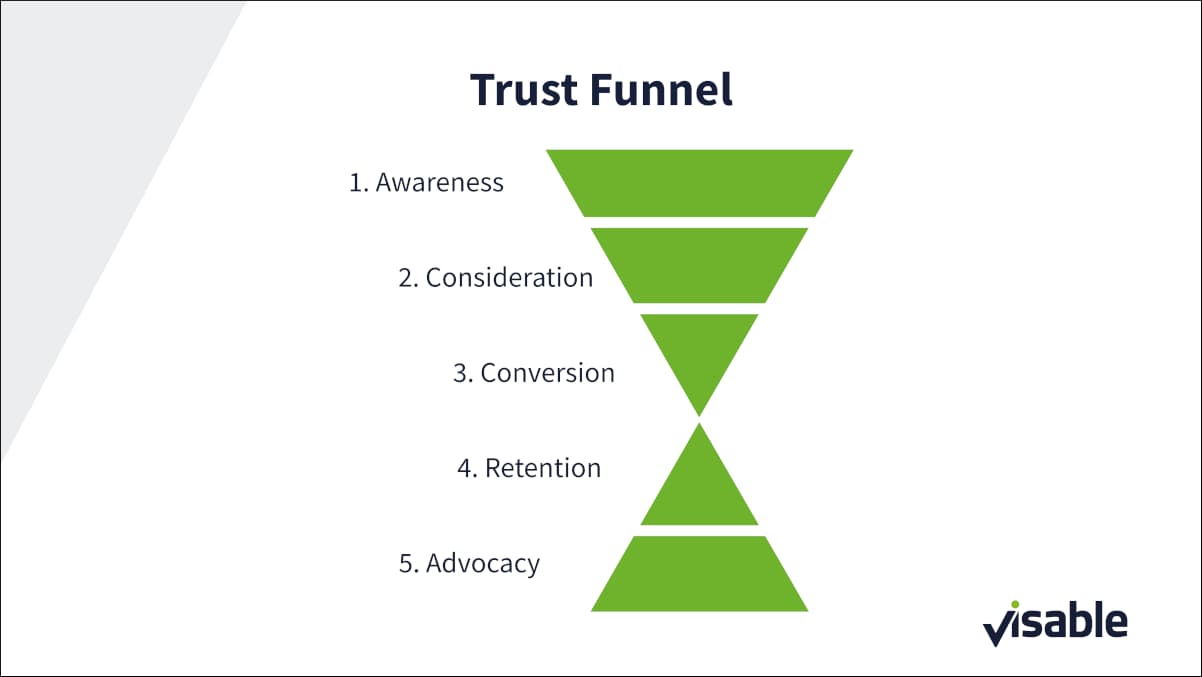The classic sales funnel hardly reflects the needs of B2B marketing in a realistic way. The trust funnel, in contrast, honours the meaning of customer loyalty and satisfaction to a strong degree. Read here how this funnel is built up.

The classic approach: sales or conversion funnel
The sales funnel reflects the customer journey – in other words, the path which the interested customer takes step by step on their way to a conversion:
- The Top of the Funnel (ToFu) encompasses the awareness phase in which attention to the offer is generated.
- The Middle of the Funnel (MoFu) includes the consideration phase in which the potential customer has already signalled a certain interest.
- The Bottom of the Funnel (BoFu) covers the conversion phase in which leads are generated.
After each phase, potential buyers are filtered out who are not interested or do not have enough budget for the offer of a company. At the end of the sales funnel are therefore those customers leftover who commission orders or order products. Whether sales funnel, conversion funnel or marketing funnel – all of these usually describe the same concept but are named differently depending on the perspective of the respective department within a company.
Further development: trust funnel has a different focus
The first three phases of the Trust Funnel are not different from those of the Sales Funnel. However, the Trust Funnel features two additional phases. In contrast to the Sales Funnel, the Trust Funnel does not stop with the closure of the deal – it also includes the time after the sale.
· In the Retention Phase is when a bond with the customer should take place after the sale. Remain approachable and be at your customer’s side as a consultant during implementation, answer all their questions and actively request their feedback.
· In the next phase, the Advocacy Phase, the customer should become a company ambassador by recommending the company to family, friends, colleagues and more. Such customers are rare and therefore all the more valuable. To ensure a long-term positive impression supporting a recommendation, it’s important to remain in touch with the customer. Birthdays and other occasions are ideal for this. But careful: don’t promote your products in the process – instead, offer content with added value to existing customers.

The significance of the Trust Funnel for B2B
After all, especially in B2B, it is important to continually build up a trusting relationship with the customer after a purchase. Mainly for these two reasons:
- To meet customer needs in B2B, a much higher level of individualisation is required in many cases. The costs resulting from this are usually only returned within the scope of a long-term customer relationship.
- In B2B, the customer relationship exists between several persons of all involved companies as a rule of thumb. To balance out and do as much justice as possible to this high number of opinions and voices requires intensive customer management, which contributes to building trust.
Measures for strengthening customer loyalty for B2B
To reinforce customer loyalty and thus the trusting relationship within B2B, a host of measures are possible:
- The most important: remain in touch with the customer even after the purchase and offer your support.
- Set up forums or special social media accounts to guarantee a fast dialogue.
- Follow up after a certain time and ask the customer how satisfied they are with the product or service.
- Implement professional complaint management in your company.
- Provide your customers with new details time and again and application options for the product or service.
- Send your customers personalised offers which provide added value, such as via a newsletter.
- Reward loyal customers by offering discounts or with the use of a bonus programme.
